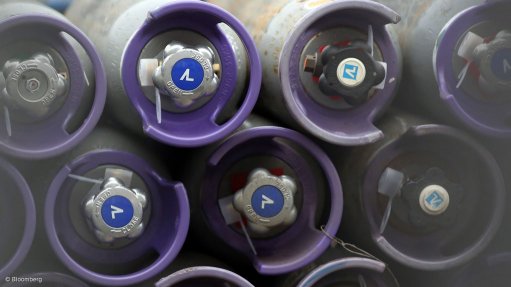Once range of EVs hits 300 km, prices should fall – BMW
Electric vehicles (EVs) could see a reduction in costs once their range reaches around 300 km, says BMW management board member for development Klaus Frölich.
EVs are significantly more expensive than cars with conventional combustion engines. This is partly due to the battery, which makes up around two-thirds of the cost of an electric power train.
Vehicle manufacturers, however, currently use the gains made in battery development – especially in battery energy density – to increase range, rather than to cut costs.
Energy density is a measure of how much energy a battery can hold. The higher the energy density, the longer it will last before needing to be recharged.
“We see a 20% to 25% energy density increase in batteries every two to three years,” says Frölich.
Once the EV range reaches around 300 km – which “should be sufficient” for customers using such a vehicle – BMW believes it will be able to use the next step in energy density development to reduce the cells placed in the car and, therefore, the cost of the battery.
“At the moment, I invest all the progress in energy density in improving the range, so the costs stay the same,” explains Frölich.
He believes EVs should start to see some price tag parity with internal combustion engines “beyond 2020”.
He adds that he has just started the development of BMW’s fifth-generation electric power trains, which will be available “in 2020-plus”.
In this process, BMW is not only reducing costs, but also “making the technology and the batteries more robust”.
Frölich says the German manufacturer will this year introduce an i3 with “50% more range in the same package”.
The current BMW i3 EV has a range of between 130 km and 160 km.
Improving the range will be an important innovation in one of the i3’s biggest markets – Norway, where it outsells all other BMW models – as extreme cold can slash an EV’s range quite substantially.
“Under cold conditions, a battery needs more energy density. Cold is more difficult for batteries than heat,” explains Frölich.
EVs will also benefit from removing the outer mirrors, he adds.
“In EVs, the impact of aerodynamic drag is bigger than the impact of weight. We have to reduce the aerodynamic drag further.”
BMW is working towards achieving a drag coefficient (aerodynamic drag) of 0.2 on its vehicles by around 2020, he notes.
The current 7 Series clocks in at around 0.24.
“For that reason, built-on parts, like mirrors, should disappear,” says Frölich.
He says BMW is working with other vehicle manufacturers to implement regulations that will allow for mirrorless cars.
Will there ever be an electric M-performance model?
No, says Frölich.
M-cars will always have an internal combustion engine, with any electric power train relegated to provide support, and only support.
Frölich believes that the conventional internal combustion engine is edging nearer to its full potential in terms of fuel efficiency.
The current small, highly turbocharged engines favoured by many manufacturers to cut emissions and fuel consumption do produce less carbon dioxide (CO2), but also “a lot of nitrogen oxides”.
“We have to balance these other emissions with CO2 emissions. So the next step may be an internal combustion engine supported by a 48 V system, which is quite expensive,” says Frölich.
R&D Budget Squeeze
Frölich is facing quite a challenge as head of development at BMW.
He has to ensure that the continuous improvement of petrol and diesel engines, which are expected to stay in the market for some time still, while also overseeing a reduction in the cost of EVs, otherwise customers will “not be able to afford them”.
Developing electric power trains “costs billions of euros”, he notes.
BMW also has to develop fuel cell vehicles, which will be able to deliver the longer driving ranges that normal EVs are unlikely to reach.
Developing parallel to this power train revolution is “the new frontier” of fully autonomous driving, which creates “enormous pressure” to build up competence in artificial intelligence, software source codes, and so forth, says Frölich – expertise which is not always available in Germany.
He is adamant that BMW will not cooperate with tech firm Google to develop autonomous driving software. Google recently rolled out its own autonomous driving programme.
“We will ensure our customers’ privacy. We want to be independent from companies that want customers’ data.”
However, he acknowledges that BMW will “have to” cooperate with the tech industry to roll out autonomous driving.
Two-thirds of the calculation performance of autonomous driving will not be in the car, but in the cloud, says Frölich. Cloud providers like Microsoft already offer a “big toolkit of artificial intelligence, machine learning, deep learning” which serves to predict human behaviour.
“So, yes, we will need a lot of cooperation partners to handle this disruption.”
Comments
Press Office
Announcements
What's On
Subscribe to improve your user experience...
Option 1 (equivalent of R125 a month):
Receive a weekly copy of Creamer Media's Engineering News & Mining Weekly magazine
(print copy for those in South Africa and e-magazine for those outside of South Africa)
Receive daily email newsletters
Access to full search results
Access archive of magazine back copies
Access to Projects in Progress
Access to ONE Research Report of your choice in PDF format
Option 2 (equivalent of R375 a month):
All benefits from Option 1
PLUS
Access to Creamer Media's Research Channel Africa for ALL Research Reports, in PDF format, on various industrial and mining sectors
including Electricity; Water; Energy Transition; Hydrogen; Roads, Rail and Ports; Coal; Gold; Platinum; Battery Metals; etc.
Already a subscriber?
Forgotten your password?
Receive weekly copy of Creamer Media's Engineering News & Mining Weekly magazine (print copy for those in South Africa and e-magazine for those outside of South Africa)
➕
Recieve daily email newsletters
➕
Access to full search results
➕
Access archive of magazine back copies
➕
Access to Projects in Progress
➕
Access to ONE Research Report of your choice in PDF format
RESEARCH CHANNEL AFRICA
R4500 (equivalent of R375 a month)
SUBSCRIBEAll benefits from Option 1
➕
Access to Creamer Media's Research Channel Africa for ALL Research Reports on various industrial and mining sectors, in PDF format, including on:
Electricity
➕
Water
➕
Energy Transition
➕
Hydrogen
➕
Roads, Rail and Ports
➕
Coal
➕
Gold
➕
Platinum
➕
Battery Metals
➕
etc.
Receive all benefits from Option 1 or Option 2 delivered to numerous people at your company
➕
Multiple User names and Passwords for simultaneous log-ins
➕
Intranet integration access to all in your organisation


















